Honest, paywall-free news is rare. Please support our boldly independent journalism with a donation of any size.
From mid-August through mid-November, the grape harvest in California’s North Bay wine country coincides with the state’s wildfire season. Every night at midnight during those 12 weeks, workers in bandanas and face masks walk quickly into the vineyards. For the next eight or 10 hours, as the darkness slowly becomes dawn, they practically run down the rows. Their curved knives cut grape bunches from the vines, dropping them into the pails held by harnesses to their chests. When the pails are full, the workers rush to the gondolas behind the slow-moving tractors, dump in the grapes, and hurry back to fill them again.
The air fills with dust from feet and machines. But often a wildfire, grown huge at the end of a dry summer, casts a pall of smoke that can extend for dozens of miles. When it reaches the vineyards in Sonoma and Napa Counties, smoke combines with dust and it’s hard to breathe. “Even my saliva turns black,” says Maria Salinas, who has picked wine grapes for 20 years in Sonoma County.
The danger of wildfire smoke comes from its fine particles, which lodge themselves so deeply in the lungs that the body can’t easily expel them, causing shortness of breath, asthma, heart disease, and other illnesses. A study published in June 2024 has documented 2,305 premature deaths from wildfire smoke in Sonoma County, and 693 in Napa County, between 2008 and 2018.
For the farmworkers in the vineyards, however, the smoke and dust compound existing endemic health problems. The social determinants of their health — the way that their well-being is impacted by the economic and social forces acting on them — include the conditions at work, like the wildfire smoke they inhale. Poverty can also have a tremendous impact. The Rural Health Information Hub lists many potential complications from the living and working conditions of farmworkers, including heat-related illness, pesticide exposure, job injuries, urinary tract infections because of the lack of toilet facilities, high disease rates from tuberculosis and COVID caused by crowded living conditions, and depression due to poverty and stress.
Maria Salinas’s experience shows the way these conditions pile up. She arrived in the U.S. in 2002 from her Chatino-speaking hometown in Oaxaca, Santos Reyes Nopala. “When I started work in the grapes, there was a lot of injustice,” she remembers. “It’s been 20 years of humiliation. We didn’t have water or bathrooms. When I had to urinate, I had to go at the edge of the field. My father worked in the fields for 14 years, and died of cancer of the stomach.”
California state law has mandated employers provide bathrooms and water in the field for years, but Salinas says that it took worker pressure on the county to get enforcement. “It’s gotten better, but now the smoke is on top of all of this. My allergies have turned into asthma and I have to use an inhaler. I’ve had to go to the emergency room because I couldn’t breathe. I’m afraid that if I keep working in these conditions, I’ll have permanent damage. But I have a family to support.”
A few years ago, Salinas went to a meeting to hear a professor from Berkeley explain the dangers of the smoke, where she met Max Bell Alper, the executive director of North Bay Jobs with Justice (JwJ). “We had intense fires in 2017,” Alper said, “and fires every year until 2020, when it was really bad. We started training farmworkers to survey their communities, to get people’s experiences and find out what they wanted to do about it.”
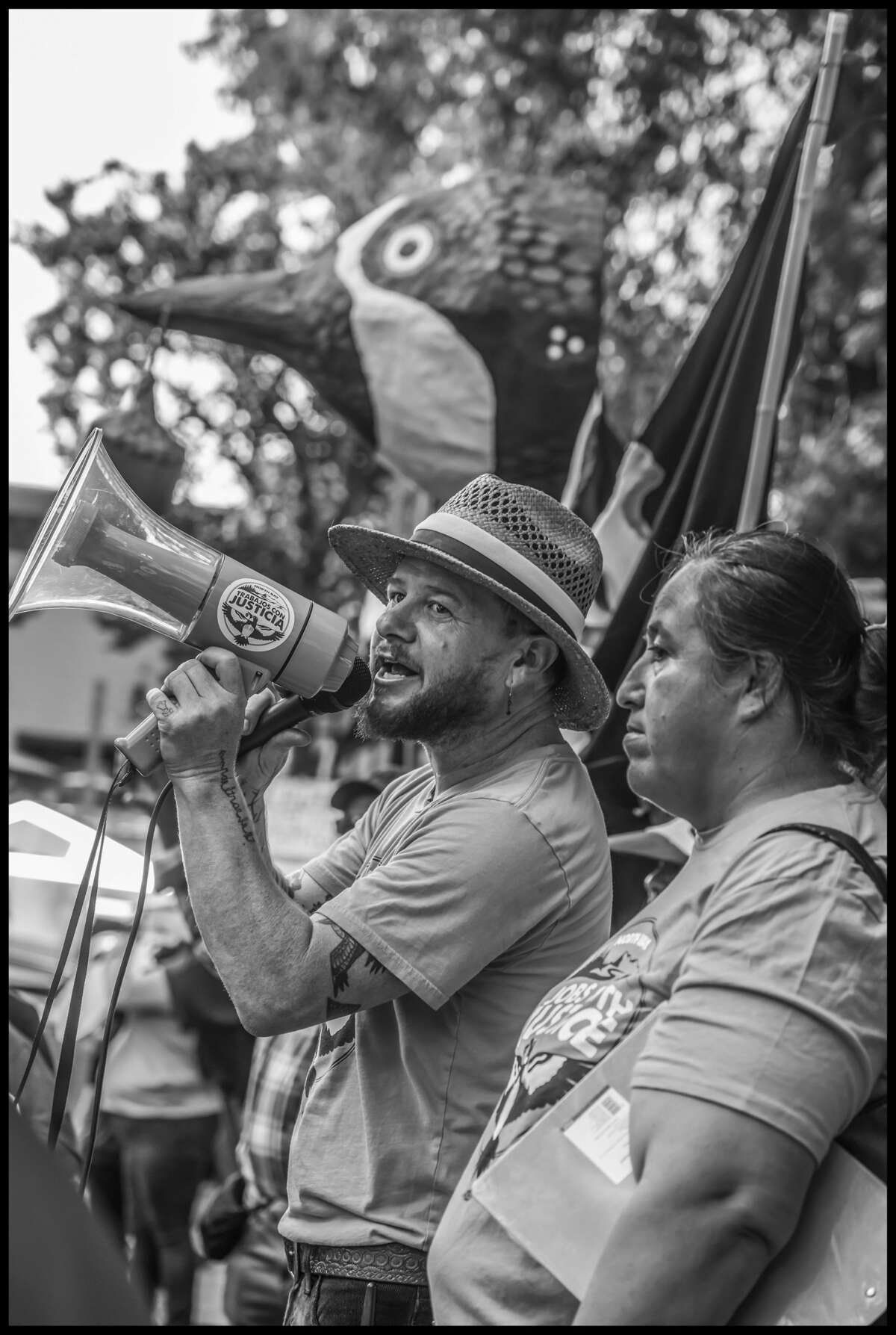
Alper and JwJ trained an equipo, or team, of farmworker organizers, and began holding broader meetings, which organized workers based on their employers, as well as their family and hometown networks. Maria Salinas became one of those equipo organizers. Because most farmworkers in the North Bay come from Indigenous Mexican communities, the surveys and work that came out of them had to be done in their original languages.
The broader meetings of workers decided on five basic demands to make of the area’s wineries and grape growers: provide clean bathrooms and water; hazard pay; disaster insurance to ensure income if workers were sent home; community safety observers to monitor conditions in the fields; and communication in the workers’ own languages. These demands were based on the fact that growers are sending workers into the vineyards even during wildfires, although evacuation orders mandate that people leave because of the danger.
In 2022, the workers, along with Jobs with Justice, took those demands to the Sonoma County Board of Supervisors. They asked the county to make their demands requirements for growers who ask permission to send workers to harvest in wildfire evacuation zones.
Many of the wineries, however, balked at the demands. To them, the effort would mean not only an increase in their costs, but also signaled the potential danger of organized workers advocating for change. In response, they brought in a notorious union-buster, Raul Calvo. As The Guardian reported in 2022, Calvo played a key role in bringing pro-company workers to testify to the county against the proposal, wearing t-shirts saying “NB [North Bay] JwJ does NOT Speak for Me.”
Alper charges that many of the workers brought by Calvo were working on H-2A visas. The H-2A program allows growers to recruit workers in Mexico, bring them to the U.S. under contracts which last just for a season, and then send them back. H-2A visa holders must apply to come back every year. They can be legally fired and blacklisted if they don’t work fast enough or incur the displeasure of the grower for any reason.
Alper says the U.S. Department of Labor, which administers the program, later told growers they could no longer bring H-2A workers to testify in government meetings. Nevertheless, he charges, Calvo continues to conduct captive audience meetings at local vineyards. Workers are required to attend, and to listen to harangues about the dangers of unions and worker organizing. (Calvo did not respond to Truthout’s multiple requests for comment.)
Despite the growers’ opposition, however, the United Farm Workers has negotiated hazard pay into labor contracts with Gallo of Sonoma, Boeschen Vineyards and Robert Mondavi Winery, and disaster insurance to compensate workers for wages lost due to fires.
This year, workers have focused their demands on the basic economics of the vineyard labor system, the source of the poverty among farmworker families. Each year, before picking starts, growers tell their crews the price they intend to pay for each ton of grapes, and the basic hourly rate that is the guaranteed minimum compensation. The price varies by company and the variety of grapes, but Salinas says that last year it went from about $150 to $200 per ton.
“This year they’re offering a 10 percent increase, which is not enough,” she says. “Sonoma County is very expensive and gas and groceries are going up all the time.” To reinforce the workers’ demands, at the end of July, North Bay Jobs with Justice organized a march in Healdsburg, the heart of the Sonoma County wine country. The demonstration demanded a “Sueldo Digno,” or decent wage, of $250/ton with a guarantee of $25 per hour.
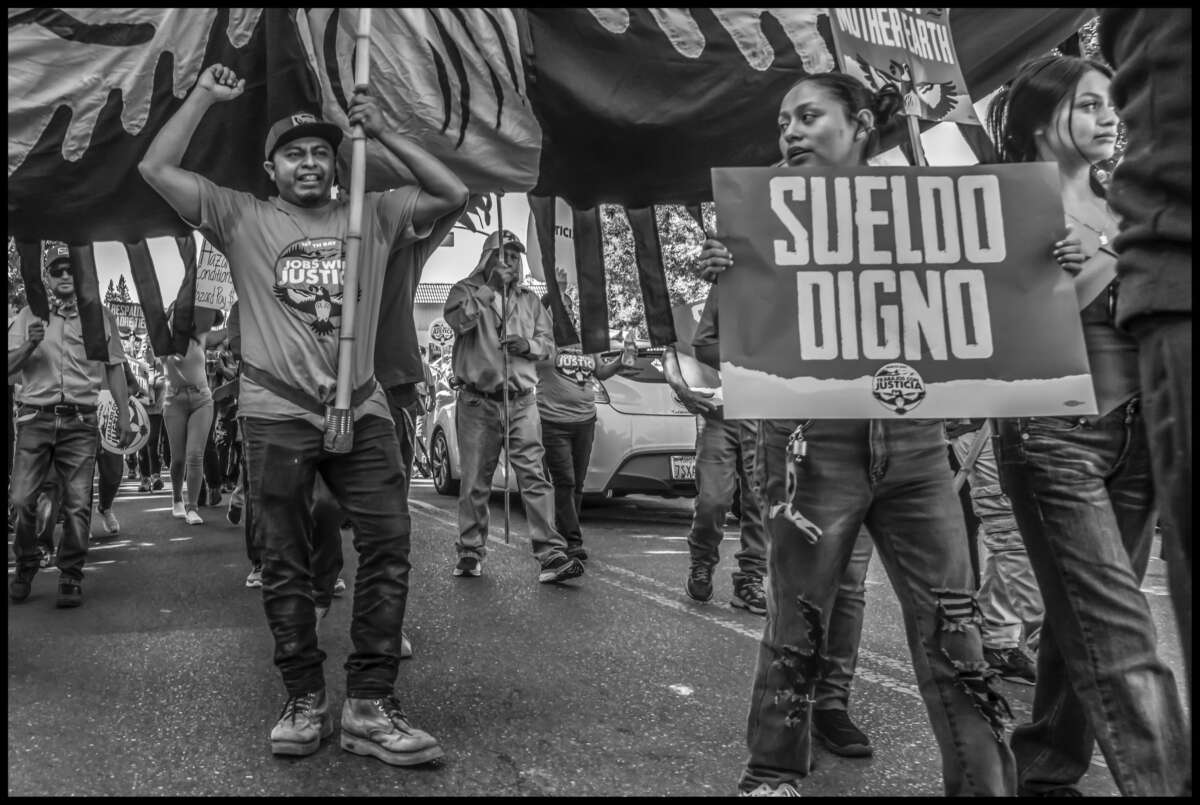
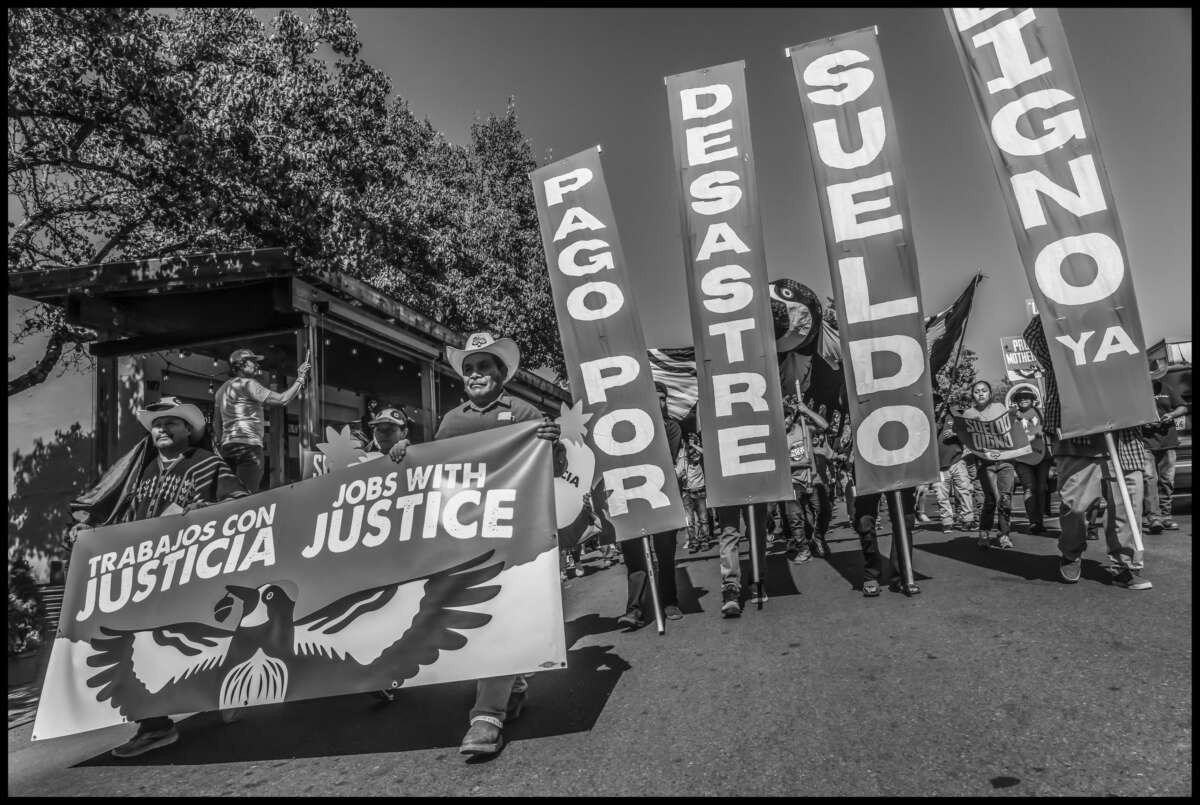
In 2022, the price growers received for a ton of grapes in Napa County ranged from $2,815 for pinot noir to $8,813 for cabernet sauvignon, for an average of $5,814. Sonoma County prices were somewhat less. At an average picking price of $150 a ton, workers were making 2.5 percent of what growers were getting. Last year, California Sen. Alex Padilla and Sonoma County Congressman Mike Thompson introduced a bill to compensate growers for smoke damage from wildfires to the grapes, but the bill contained nothing to compensate workers for their lost wages or health impacts.
The lack of acknowledgment in protections around wildfires mirrors what workers went through during the height of the pandemic. “They called us essential workers, and wanted us to work in the smoke, and every day we were in danger of getting sick from the COVID,” Salinas recalls. People went to work because they couldn’t afford not to go — just one day without pay could be difficult, and a week ruinous. Often that meant traveling in a packed car or labor contractor bus, and returning home to a crowded house shared by more than one family. Not only was isolation impossible, but the cost of acknowledging an infection could potentially cut others off from their jobs and source of income.
“Undocumented farmworkers with mild cases of COVID-19 were also reluctant to self-isolate, because they were ineligible for both unemployment insurance and CARES Act-funded pandemic assistance,” health researcher Ed Kissam told Truthout. “In addition, people worried about the government using personal information for immigration enforcement.”
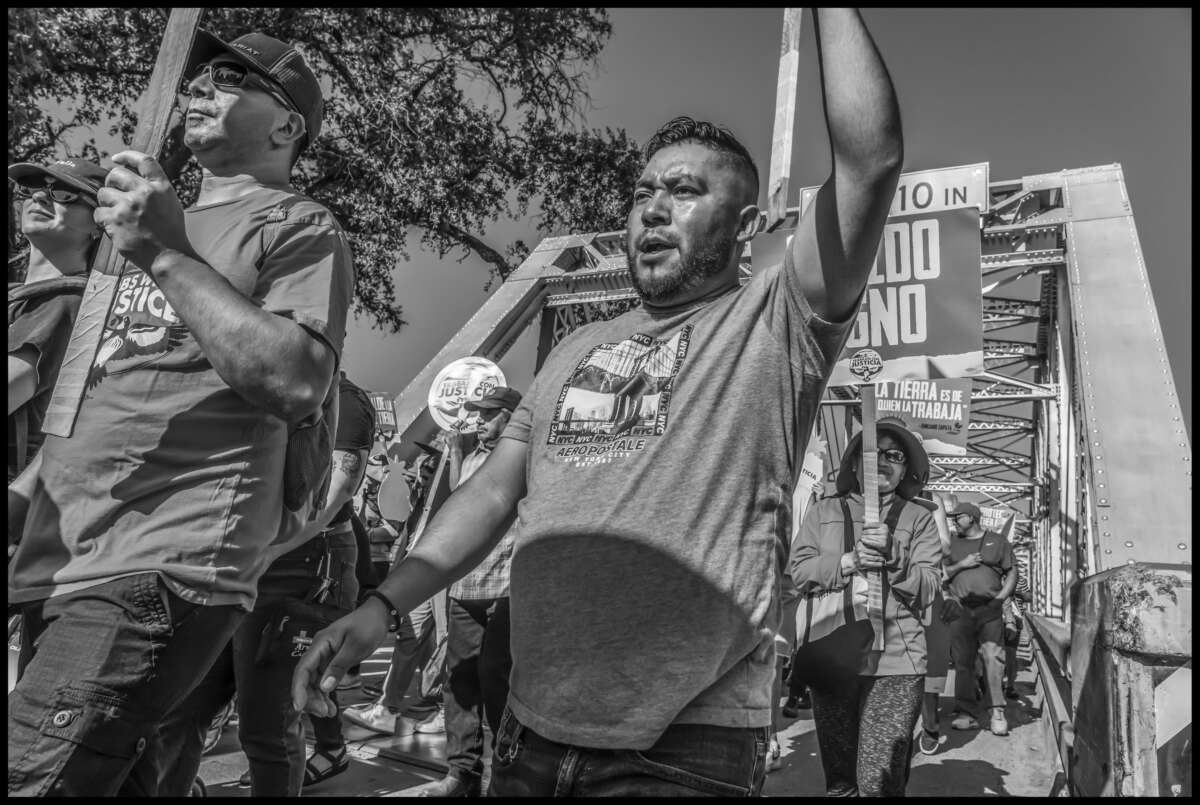

As a result, Alicia Riley, a health sociologist at the University of California in Santa Cruz, reported that COVID deaths of people employed in agriculture were about 1.6 times the national average in 2020. According to a report by the California Institute for Rural Studies, between March and June of 2020, agricultural workers in Monterey County contracted COVID-19 at three times the rate of workers in other industries. Some 583 people died in Sonoma County from the virus, and 174 in Napa County.
Arcenio Lopez, director of the Mixteco Indigena Community Organizing Project, explains, “People come to the U.S. and work for years and still can’t access health care. What determines whether they can get it are the priorities of the family. The first priority is to pay the rent, then to buy food and clothes. Health is not a priority because their economy doesn’t permit it.”
“Most farmworkers are long-term settled immigrants in low-income households that include undocumented immigrants,” Kissam added. “Their eligibility is compromised for a broad range of social programs because they’re conditioned on immigration status.” Despite the state’s extension of Medicaid coverage to undocumented people last year, about half of all farmworkers in California, and 62 percent of undocumented farmworkers, still have no medical insurance, a far greater percentage than in the general population.
Lack of immigration status is one of the most important social determinants of farmworker health. The Sonoma and Napa County wine industry, like the rest of California agriculture, has always depended on immigrant labor. Ninety percent of California’s farmworkers are immigrants, and more than half are undocumented.
It’s for this reason that farmworkers are organizing around immigration, too. Maria Salinas and Max Bell Alper were among several hundred activists who gathered last August in Petaluma’s Walnut Park, in Sonoma County’s wine country. After listening to a few speeches and cheering on a local troupe of Aztec dancers, they set off on a three-day march to the San Francisco Federal Building. Their goal was to win support for a bill that could make a profound difference in the life of North Bay farmworkers.
Currently, anyone who entered the U.S. without a visa before January 1, 1972, can apply for legal permanent residence status, known as a green card. After five years as a legal resident, they can then apply for U.S. citizenship. Unfortunately, for the estimated 11 million undocumented immigrants living in the U.S., only a tiny handful qualify under that registry date. “Ninety percent of currently undocumented people is probably an underestimate,” says Renee Saucedo, who helped organize the Northern California Coalition for Just Immigration Reform, and annual marches to support changing the registry date.
HR 1511, “Renewing Immigration Provisions of the Immigration Act of 1929,” known as the Registry Bill, would allow anyone in the country for seven years to apply for a green card. Many grassroots activists believe that fighting for the registry bill is also a way to mobilize communities in their own defense, over an issue that has a dramatic impact on community health.
“I was really proud to be part of that march,” Salinas remembers. “I was very angry, and it gave me a way of fighting for my children, so they don’t have to endure what I did, and for a world that will respect their rights.”
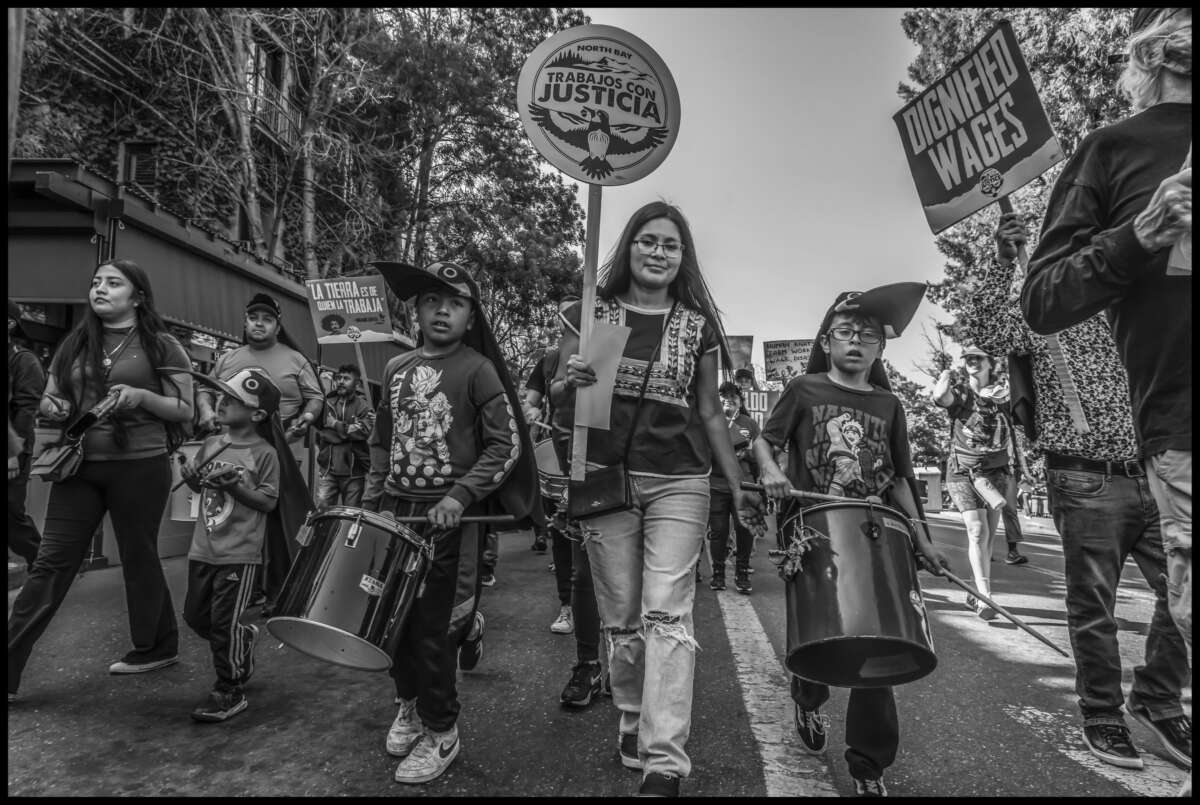
Press freedom is under attack
As Trump cracks down on political speech, independent media is increasingly necessary.
Truthout produces reporting you won’t see in the mainstream: journalism from the frontlines of global conflict, interviews with grassroots movement leaders, high-quality legal analysis and more.
Our work is possible thanks to reader support. Help Truthout catalyze change and social justice — make a tax-deductible monthly or one-time donation today.
